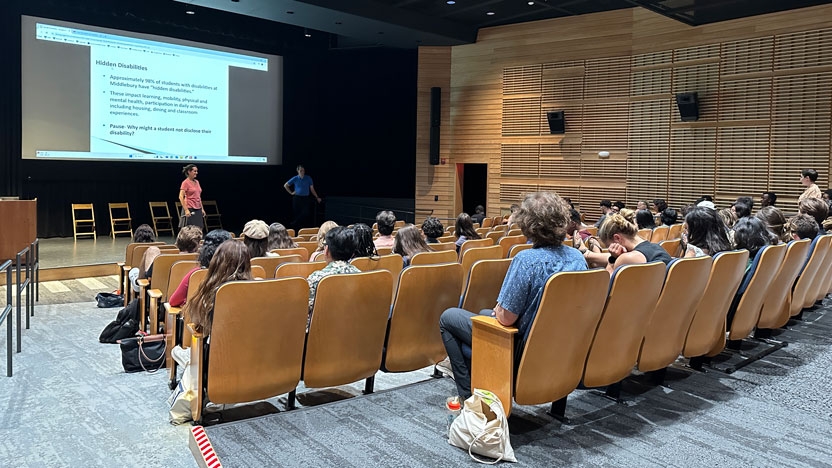Instructor Resources

The Disability Resource Center works with course instructors to troubleshoot access barriers and proactively re-imagine the design of their courses.
To do this we use concepts from inclusive design for learning that encourage educators to provide multiple methods of presentation, expression, engagement, and assessment. We can help faculty think broadly about students’ intersectional identities and create educational experiences that maximize engagement without compromising rigor.
When we are most successful in this partnership, students will have access without the need for individual accommodations.
Best Practices for Care and Collaboration
In addition to the general guidelines described below, please see our Best Practices that specifically address the following:
- Creating an Accessibility Statement
- Framing Access in Class
- Offering Pinned Sections on Course Platform
- Emailing Reminders after Add Period Ends
- Proactively Identifying Students’ Access Needs
Fostering Participation and Access
Fostering a learning environment for students to experience access and full participation results from cultivating a relationship of care and collaboration with students.
The dynamic between faculty and students—and the ways that dynamic influences how students navigate access barriers in the classroom—are essential to a positive experience.
The DRC partners with faculty and course instructors to problem-solve access barriers and brainstorm inclusive curriculum redesign initiatives. We work with you to resolve emerging student access needs and build lasting relationships that directly improve a student’s classroom experiences.
Instructor and Student Dynamics
The current process by which students request classroom accommodations requires them to approach each professor individually to implement accommodations in each course. This can be a daunting and stressful process. Some students might feel intimidated or anxious about navigating the power dynamics of these conversations; others might worry about how requesting accommodations/disclosing disability status could impact the way they are perceived by their professors.
Understanding this, faculty can proactively signal their commitment to collaborating with students to ensure their access needs are met. When done well, this may reduce student’s hesitation students to initiate the conversation.
See our suggestions for an Accessibility Statement.
Recognizing Individual Needs
While there are certain academic accommodations that many students use, it is important to discuss with students what works best for them.
For example, many students have distraction-reduced testing accommodations, but that is not a one-size-fits-all accommodation. Some students use screen reading software; some students use voice-to-text software; some need to be able to move around; and some need to be able to eat or drink. For various reasons, many students with distraction-reduced testing accommodations need to take their exams in spaces without other test takers, while others are fine in spaces with one or two people.
Discussing individual access needs allows us to recognize and appreciate the many different ways students learn—and the approaches that minimize access barriers for each student. After all, students know best what works for them. Listening, trusting, and honoring students’ self-awareness is one of the most effective ways to ensure their access needs are met.
As you collaborate with students to meet their access needs, please remember that the DRC staff are your partners in this work. Please reach out if we can support you or your students
Exam Accommodations
A centralized testing location in the basement of Proctor includes both extended-time testing seats as well as individual cubicles for distraction-reduced exams.
Students with testing accommodations receive an email at the beginning of each semester with the link to reserve slots in the testing space at least 72 business hours before the exam date.
Please note: No staff are present to proctor or distribute exams. Students take all exams under the honor code. Students are responsible for making specific arrangements directly with faculty regarding the pick up and drop off of all exams.
Faculty with questions about the centralized testing space or reservation process can contact the Disability Resource Center at ada@middlebury.edu.
Initiatives such as the centralized testing center are intended to reduce the time and energy required of faculty/instructors to locate testing spaces or coordinate extended times for students to complete exams.
For students and faculty that choose not to use the testing center, the staff in the DRC are available to help find locations for testing if necessary. A distraction-reduced exam space should be as free from disruptions as possible. It should have a door that closes, and it should be located away from as much internal and external noise as possible. There are several areas which could work including an empty classroom near the other students, a quiet area in the same building as the other students, or a quiet space in one of our libraries on campus.
Inclusive Design for Learning Award
The Center for Teaching, Learning, and Research (CTLR) and the Advisory Group on Disability Access and Inclusion (AGDAI) have collaborated to create the annual Inclusive Design for Learning Award. This award specifically highlights an instructor’s embrace of Inclusive Design and the role of Inclusive Design in high quality instruction.
Thank you to Amanda Kraus, University of Arizona, and Renee Wells, Queens University, for their support in co-creating this text and helping the DRC both dream of and lean into more inclusive policies and practices.

